AMD’s Ryzen 7000 series has dethroned the previous Ryzen 5000 series successfully and in the very first batch, AMD launched a couple of mid and high-end processors falling in the Ryzen 5, Ryzen 7, and Ryzen 9 sub-family.
While Ryzen 5 and Ryzen 7 are more popular due to being cheap and perfect for gaming purposes, the Ryzen 9 sub-family comprises enthusiast-grade CPUs that feature a high core/thread count and higher power consumption.
The two most powerful Ryzen CPUs we currently have are the Ryzen 9 7900X and the Ryzen 9 7950X. Obviously, the 7950X is a better processor when we compare the specs but that doesn’t tell the whole story.
We need to compare them head to head in specifications, architectural design, compatibility, thermals, gaming performance, non-gaming performance, and value. This will help us conclude the result that will decide which one will be better for you.
Specifications Difference
SPECS | AMD RYZEN 9 7900X | AMD RYZEN 9 7950X |
Code Name | Raphael | Raphael |
Lithography | 5nm | 5nm |
Socket | AM5 | AM5 |
Cores/Threads | 12/24 | 16/32 |
Clock Speeds | 4.7/5.6GHz | 4.5/5.7GHz |
L2/L3 Cache | 12/64MB | 16/64MB |
TDP | 170W | 170W |
Integrated Graphics | Yes | Yes |
Theoretical specifications of both these CPUs aren’t too different. The most obvious difference between the two is the core and thread count. The 7950X is a top-tier CPU with 4 more cores and 8 more threads.
Another difference is the size of the cache memory. The 7950X brings more L1 and L2 cache than the 7900X but the L3 cache remains the same at 64MB. This may or may not result in a different distribution of L3 cache per core.
Other things like socket compatibility, overclockability, TDP, and RAM compatibility are identical. So, there isn’t much about the specs. However, the core clock speeds are noticeably different where the 7950X is 100MHz higher in boost clock but 200MHz lower in base clock speed.
This is the norm with every two succeeding Ryzen CPUs in this generation where the boost clock of the faster CPU is always more than the slower one but features a lower base clock than the other.
- Processor is versatile, reliable, and offers...
- Ryzen 9 product line processor for your...
- 5 nm process technology for reliable performance...
- Dodeca-core (12 Core) processor core allows...
Architecture
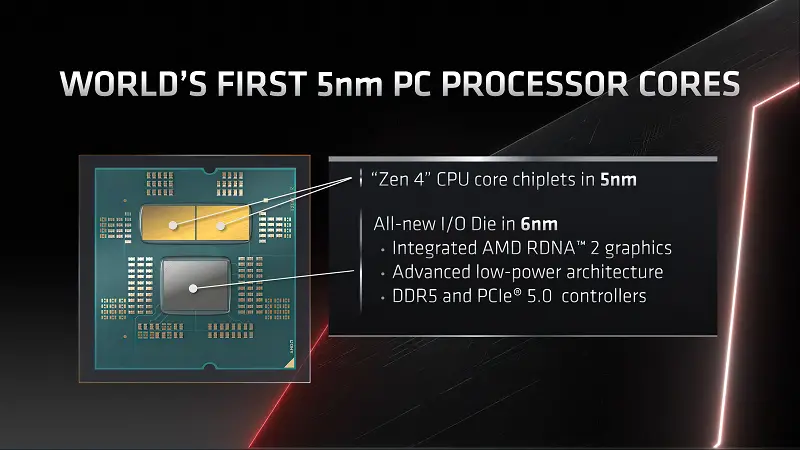
Ryzen 7900X and 7950X feature Zen 4 architecture which succeeds Zen 3 and is made on a smaller 5nm process node from TSMC which makes the 7000 series the first desktop CPUs to ever feature this process node. It has been greatly improved over the last Zen architectures but the block design of these CPUs isn’t made from scratch.
Even though the performance boost of around 20% you get over the Ryzen 5000 family is impressive, 50% of this performance boost is due to higher clock speeds. The rest is due to the improvements in the block design and architectural improvements.
Zen 4 drops the block design of Zen 3 where there was only one CCD(Core Chiplet Die) featuring 8 cores each. Zen 4 brings back the Zen 2 block design where each CCD contains two CCX(Core Complex) and each CCX features 4 cores.
The 4+4 cores can still access all the L3 cache available for a particular CCD like the Zen 3 but the big advantage is that now Zen 4 brings a double L2 cache which further speeds up the processing. As the 7900X brings 12 cores, each CCD has two cores disabled but the 7950X has all the 8 cores per CCD enabled.
Integrated Graphics
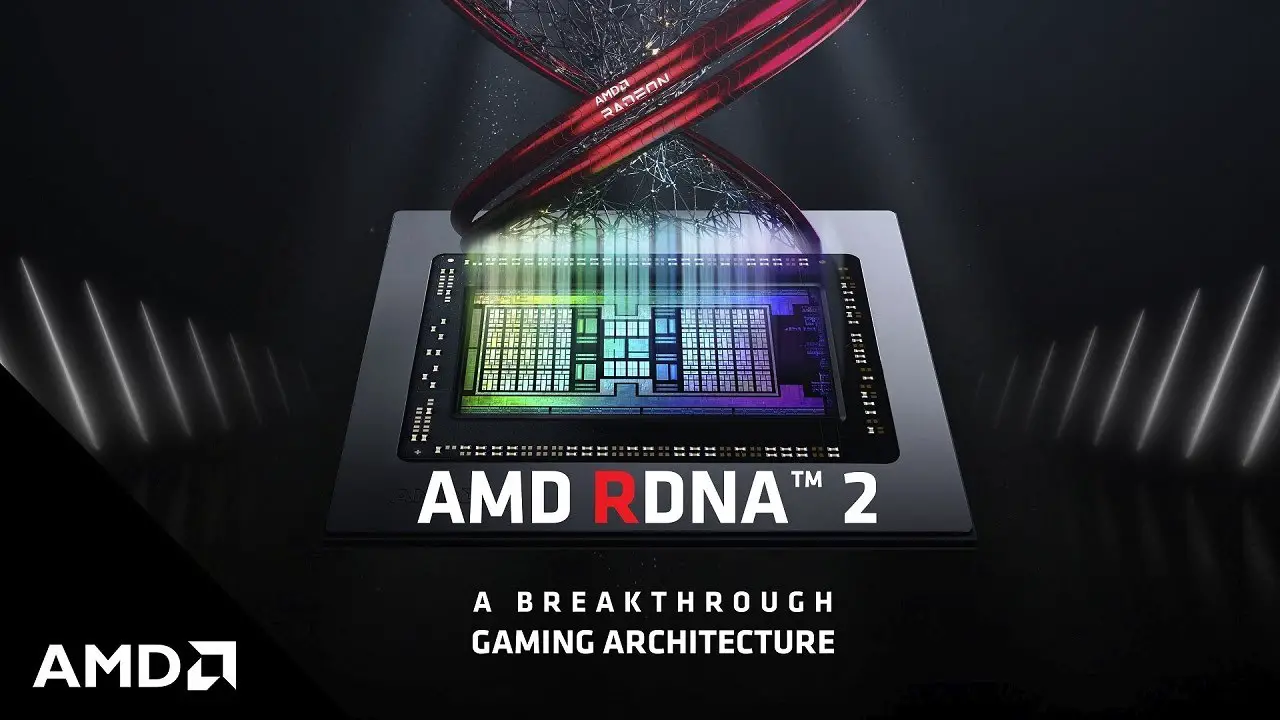
The biggest improvement in the Ryzen 7000 series is the availability of integrated graphics. Commonly, Ryzen CPUs aren’t known to feature iGPUs as AMD releases separate categories of CPUs known as “APUs” for those who need a powerful iGPU solution.
However, this time AMD is trying to compete with Intel processors that have always brought the iGPUs on the mainstream desktop processors. The 7900X and 7950X both bring RDNA 2 based integrated graphics. This GPU is the same across all the Ryzen 7000 processors featuring 2 GPU cores and a clock speed of 2200MHz.
The iGPU isn’t that powerful to play games smoothly but is powerful enough to power up the display and support higher resolutions. This avoids any need for buying a discrete GPU if the user doesn’t need a powerful GPU for tasks requiring powerful graphics processing.
- Processor consumes less power to offer maximum...
- Ryzen 9 product line processor for better...
- 5 nm process technology provides optimal...
- Hexadeca-core (16 Core) processor core efficiently...
Motherboard And RAM Compatibility
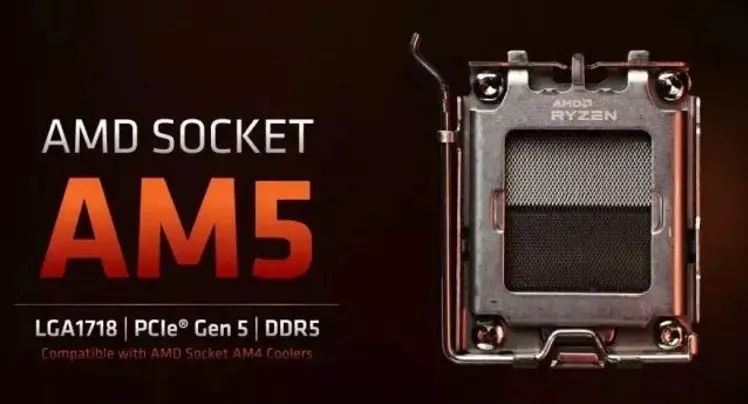
Motherboard and RAM compatibility of both the CPUs remain the same as both are compatible with the AM5 socket and support DDR5 natively.
They aren’t backward compatible which means you can’t use them on an AM4 socket and can’t use DDR4 memories with them. Currently, we have only four chipsets in total that are available with the AM5 socket but those are actually two dual chipsets with additional technology.
These are the X670, X670E, B650, and B650E where the “E” stands for Extreme that provides more PCI-E 5.0 lanes.
AM5 motherboards only support DDR5 RAM and the 7900X and 7950X by default can support up to 5200MT/s clock speed out of the box and dual channel memory configuration.
Thermals And Power Consumption
Ryzen 7000 processors have been tested by several reviewers as of now and the thermals are terrible. Whether you use the 7900X, 7950X, or any other Ryzen 7000 CPUs, the temperatures will easily hit 90C even with aftermarket CPU coolers.
AMD still calls it “normal” although the Max. Operating Temperature limit of the Ryzen 5000 and 7000 series isn’t too far. The 7000 series have a critical temperature of 95C whereas the 5000 family features 90C.
Still, the 5000 series is easily able to maintain temperatures below 75C with a good cooling solution. The 7900X, and 7950X will easily go above 90C with an intermediately powerful CPU cooler which makes it necessary to use a much more powerful CPU cooler, say a 280-360mm AIO cooler at the least.
Thankfully, there is one great news for those who are upgrading from an AM4 platform. The AM5 socket is backward compatible as its size is similar to the AM4 socket and most AM4-compatible CPU coolers can be used on AM5 motherboards out of the box.
As far as the comparison goes between 7950X and 7900X, the 7950X runs at around 95C while the 7900X remains 5C cooler at 90C. 95C is already the max limit of 7950X. So, it is still concerning how AMD calls it completely normal.
As for the power consumption, we have variations in results because every configuration is different and temperature measurement can’t be the same for every two rigs. Still, we can see that the 7950X consumes around 30-53W more than the 7900X on full load.
The 7950X even reaches at 251W as tested by GN which is 21W higher than the Peak Power Consumption for AM5. Crazy indeed.
Gaming And Non-Gaming Performance

Theoretical specs and architectural design are just a small part of the whole picture. The real-world performance is what we need in order to declare a winner between the two. While the 7950X is already a better choice as per specs, the gaming and non-gaming performance can tell us the real story.
To compare both these CPUs, we will consider benchmarks from some of the reliable third-party sources like GamersNexus((https://youtu.be/LJeEd7_Cv90)), Tomshardware((https://www.tomshardware.com/reviews/amd-ryzen-9-7900x-cpu-review)), Techpowerup((https://www.techpowerup.com/review/amd-ryzen-9-7900x/)), and MMORPG((https://www.mmorpg.com/hardware-reviews/amd-ryzen-9-7900x-and-ryzen-9-7950x-review-2000126265)). Most of these sites provide both gaming and applications benchmarking comparing several processors from the same as well as previous generations.
The GPUs used vary but are RTX 3080 and above which gives us consistent results without any bottlenecks. After comparing the benchmark numbers from all these sources, we can conclude our result easily which will be more accurate than considering only one source.
Consider only gaming benchmarks, there is literally no difference between the 7900X and 7950X . At this point, the improvements in gaming stop as the 7900X and 7950X are overkill for playing video games. The difference in gaming performance already stops when we compare the 7700X and 7900X and therefore, comparing the 7900X and 7950X is no longer interesting as the results across different sources are identical.
The story is a little different in professional and CPU-dependent applications. Applications that require more cores generally benefit much more than video games. The 7950X here shines much better than the 7900X.
As per the benchmarks, the 7950X is much better in compression, encoding, and rendering. Applications that require these processes hugely benefit from the 7950X as more cores are better but the single-core test numbers are identical as the single-core power of both the CPUs is equivalent .
When we consider the applications which saw significant differences in performance, the 7950X is roughly 31% faster in multi-threaded tasks, 32% faster in blender, 26% faster in compilation, 7-10% faster in video encoding, 15% faster in compression and around 32% faster in decompression than the 7900X.
On the other hand, there are only a few areas where the 7900X is as good as the 7950X including IPC, single-core performance, and photoshop.
Value Comparison
The Ryzen 7900X was launched at a price of $549 whereas the 7950X costs $150 more at $699. If we consider an average performance gain with the 7950X, we can get a good idea of how much value is obtained with each of these CPUs.
As per calculations, the 7950X is around 20-25% faster than the 7900X in multi-threaded operations but the single-threaded performance boost is negligible. Considering that you are going to use either of the processors only for multi-threaded operations, the 20-25% better performance with the 7950X is achievable by paying 27% more money.
This is the maximum performance benefit you are getting if we are ignoring all the other types of benchmarks. So, already, the 7950X is looking inferior to the 7900X in terms of value. When we consider the single-core and multi-core performance together, we are getting around 10-12% better performance with the 7950X for 27% more price .
The value of 7950X further decreases if we consider both gaming and non-gaming benchmarks where you are getting around 5% of maximum performance boost with the 7950X on an average by spending 27% more price.
Well, certainly most people aren’t going to buy the 7900X or the 7950X for gaming therefore, it is safer to say that the ~10% or ~20% performance difference between the two for a 27% price difference is still going in favor for the 7900X.
Conclusion And Final Words
Most professional and content creators will be good with the Ryzen 7900X but if you are really serious about your work and need to save those extra seconds or minutes, go with the 7950X.
Let us know which CPU you are going with in the comments below and why.
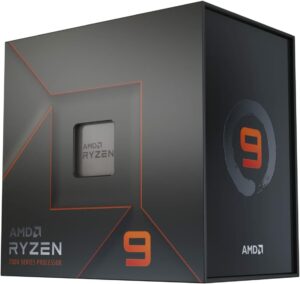
Reasons To Buy Ryzen 9 7900X
[wp-svg-icons icon=”thumbs-up” wrap=”i” color=green] Much better value per dollar
[wp-svg-icons icon=”thumbs-up” wrap=”i” color=green] Better overall gaming and productivity

Reasons To Buy Ryzen 9 7950X
[wp-svg-icons icon=”thumbs-up” wrap=”i” color=green] Better in rendering and compression
[wp-svg-icons icon=”thumbs-up” wrap=”i” color=green] More future proof
Related:
- AMD Ryzen 5 7600X vs Ryzen 7 7700X
- AMD Ryzen 5 7600X vs Ryzen 5 5600X
- AMD Ryzen 5 7600X vs Intel Core i5 12600K
- AMD Ryzen 5 7600X vs Ryzen 7 5800X3D
- AMD Ryzen 7 7700X vs Ryzen 7 5700X
- AMD Ryzen 7 7700X vs Intel Core i7 12700K
- AMD Ryzen 7 7700X vs Ryzen 7 5800X3D
- AMD Ryzen 7 7700X vs Ryzen 9 7900X
- AMD Ryzen 9 7900X vs Intel Core i9 12900K
- AMD Ryzen 5 7600X vs Intel Core i9 12900K
- AMD Ryzen 9 7900X vs Ryzen 9 5900X
- AMD Ryzen 9 7950X vs Ryzen 9 5950X
- AMD Ryzen 7900X vs Core i7 13700K
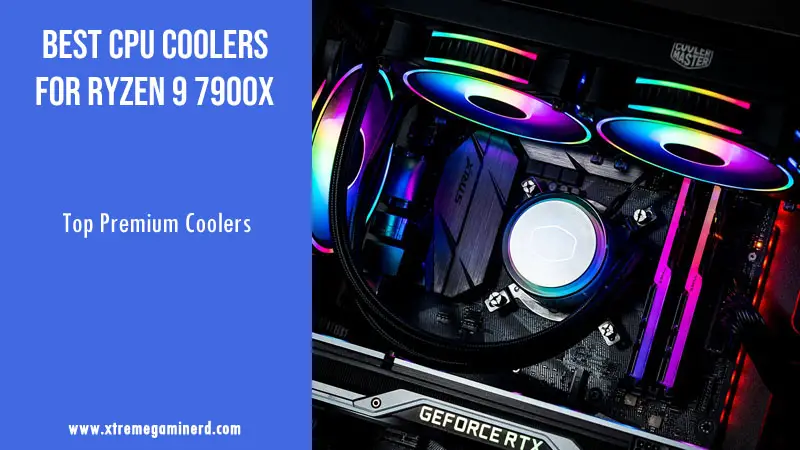
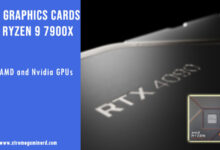


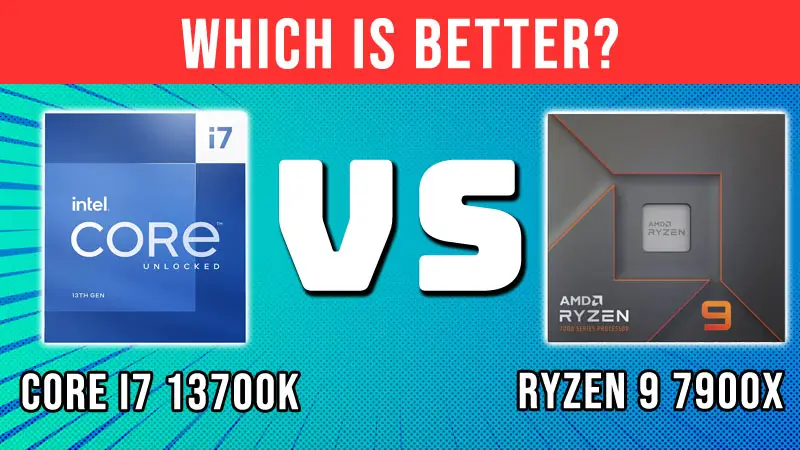
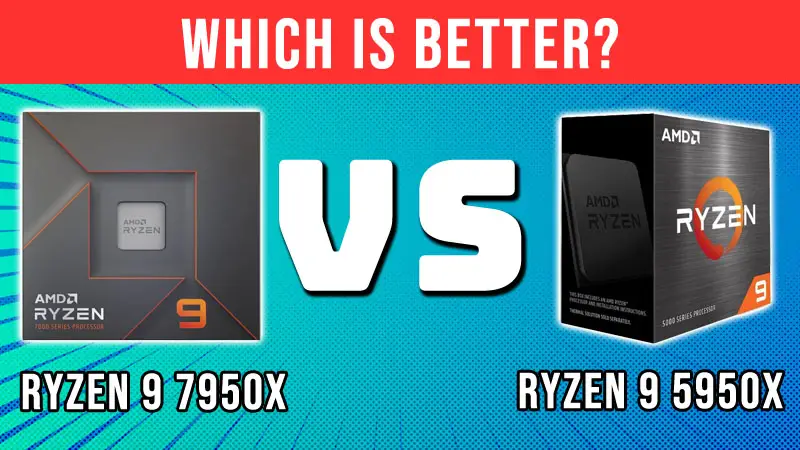
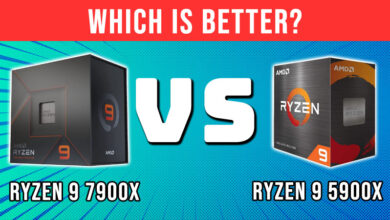
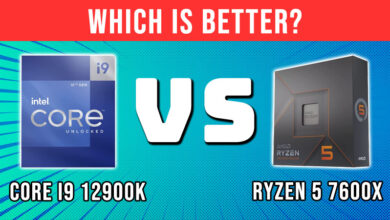
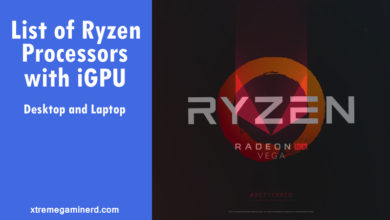
The Highlighted text but the single-core numbers are identical as the single-core performance of both the CPUs is equivalent. is “Highlighted text ” an error?
Yeah. That’s an error. Thanks for pointing that out. I fixed it.